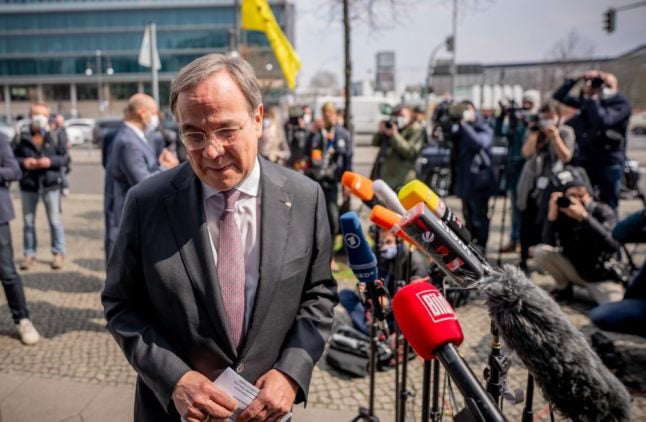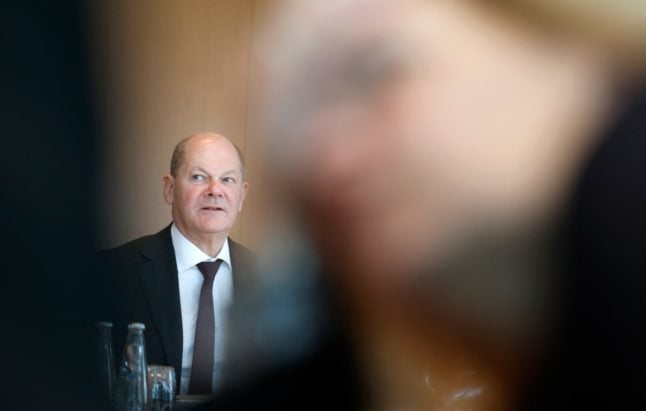After more than six hours of talks, 46 executive board members of the Christian Democratic Union (CDU) held a secret online ballot that resulted in 77.5 percent support for party leader Laschet, participants told AFP.
Bavarian premier Söder, leader of the CDU’s smaller CSU sister party, garnered 22.5 percent.
Söder, who is more popular than Laschet in opinion surveys, had earlier said he would accept the CDU’s decision and step aside “without resentment” if senior members favoured his rival.
The late-night vote marked the culmination of a bruising week-long power struggle that has brought Merkel’s once stable CDU-CSU alliance to the brink of implosion.

Armin Laschet and Markus Söder. Photo: DPA
With just five months to go before the September 26th election, when Merkel bows out after 16 years in power, the conservatives’ poll ratings have plummeted recently over their handling of the coronavirus pandemic.
Laschet, a long-time Merkel ally and the premier of Germany’s most populous state North Rhine-Westphalia, had already secured the backing of CDU top brass last week.
READ ALSO: German conservatives fear ‘polarisation’ over Merkel succession
Elected as head of the CDU in January, Laschet would usually be the obvious choice to lead the centre-right CDU and its Bavarian CSU partner into the elections.
But the 60-year-old has been panned in recent months for flip-flopping on measures aimed at curbing the virus spread in his state, even attracting criticism from Merkel herself.
Laschet’s claim to be chancellor candidate has been fiercely contested by Söder, 54, who after months of keeping Germans guessing about his ambitions finally announced his bid for the top job on April 11th.
The former television journalist, who has echoed Merkel’s stance for tough curbs to tame Germany’s Covid-19 surge, currently commands more support from the German public and conservative lawmakers.
Merkel has not weighed in on the row, saying last week: “I wanted to, want to and will stay out of it.”
Participants at Monday’s marathon talks told German media that Merkel sat in on the video conference but did not contribute to the discussions, with some observers reading into her silence a lack of support for Laschet.
Disciplined Greens
Söder told reporters on Monday that the CDU, as “the bigger sister party” had the ultimate say in who to send into the race for Merkel’s job.
“We don’t want to and we won’t see a rift between the CSU and the CDU,” he insisted.
A recent poll by public broadcaster ARD showed 44 percent of Germans in favour of Söder as most qualified as the CDU-CSU’s chancellor candidate. Laschet only had 15 percent of support.
READ MORE: Merkel’s conservatives fail to reach deal on who will be chancellor candidate
It remains to be seen whether the CDU’s internal vote marks the end of the conservative tug-of-war, with CDU-CSU parliamentarians set to hold a meeting on Tuesday.
Addressing Monday’s late night video conference, Volker Bouffier, regional premier of Hesse state who supports Laschet, warned that the board’s decision “may not be accepted” by the party base.
The squabbles have damaged the alliance’s standing at a time when Europe’s biggest economy is struggling to end a pandemic that has killed 80,000 and ravaged thousands of businesses and livelihoods.
The chaos in the conservative camp also stands in stark contrast to the centre-left Green party, polling second behind the CDU-CSU, which on Monday announced co-chair Annalena Baerbock as its chancellor candidate at a slick press event with no signs of strife.
Congratulating Baerbock on the nomination, Laschet promised a “fair election campaign” and urged parties to be “respectful” of each other in a veiled warning to Sôder.



 Please whitelist us to continue reading.
Please whitelist us to continue reading.
Member comments